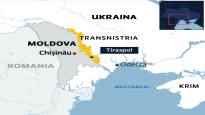Arkady Moshes, program director of the Foreign Policy Institute, believes that Russia’s influence in Transnistria, which became unilaterally independent of Moldova, is not militarily dangerous for Ukraine.
Program Director of the Foreign Policy Institute Arkady Moshes regards the attacks and explosions in Transnistria, Moldova, as provocations. According to Moshes, it is difficult to judge who will benefit the most.
The future of Transnistria depends to a large extent on how the various parties now react.
– If no one is provoked, the provocations usually end, Moshes says.
The Transnistrian administration reported three attacks
The Transnistrian administration, which has unilaterally declared independence from Moldova, said on Monday that the building it used in Tiraspol was apparently hit by a grenade.
On Tuesday, the Transnistrian administration reported two new attacks.
According to the administration, two masts of the radio station were destroyed in an explosion near the Ukrainian border north of Tiraspol, Reuters reports.
Another attack targeted a military target near Tiraspol, a local TV channel says the administration said. No one was wounded in the attacks.
President of Moldova Maia Sandu convened the Security Council on Tuesday over Transnistria. The president said at a news conference this afternoon that the perpetrators of the attack are estimated to be pro-war factions in Transnistria.
The Moldovan administration said after Monday’s attack that the attackers aimed to create an excuse to weaken the security situation in the region. He told about it, among other things Deutsche Welle. (switch to another service)
According to program director Arkady Moshes, there is still too little information to assess the perpetrators of the attack and their motives.
According to Moshes, it is difficult to say whether Russia would have an interest in such acts in Transnistria.
– It’s hard to see what they would achieve with this. No one would find it credible that Russian-speaking residents are under threat in Transnistria, Moshes says.
Moshes does not believe that the Ukrainians are behind the attacks. Ukraine does not need more problems.
Not even Russia has recognized the independence of Transnistria
Transnistria is located in the eastern part of Moldova, approximately in the area between the Ukrainian border and the Dniester River. It is just under half the size of Uusimaa. The area has an estimated 350,000 inhabitants.
Transnistria is officially part of Moldova. In 1990, it declared independence, but no country has recognized its independence.
Almost a third of Transnistria’s population is Russian-speaking. There are Russian soldiers in the area who Russia has called peacekeepers. However, the Council of Europe considers them occupiers.
Russia hinted that it was seeking a land connection to Transnistria
Transnistria reported (moving to another service) widely at the end of last week when the Russian deputy commander Rustam Minnekayev suggested that Russia’s goals go beyond Ukraine.
The deputy commander talked about how the rule of southern Ukraine would guarantee the Russians a connection from Ukraine to Transnistria.
According to Moshes, there was nothing new in the deputy commander’s comment. For years, experts have considered Russia to take over not only several other regions of Ukraine but also the Odessa region in the southwestern part of the country, on the border with Moldova.
However, Russia may not have the resources for an attack that would lead to the capture of Odessa.
According to Moshes, Russia’s influence in Transnistria is not very dangerous for Ukraine militarily. Russia does not have enough troops in Transnistria to threaten Ukraine from there.
The political significance of Transnistria for the war in Ukraine is also insignificant.
Moldova needs to weigh up its relations with Ukraine
The bad thing about extending the war to Transnistria would be, above all, for Moldova.
After the start of the war in Ukraine, Moldova applied for EU membership, as did Ukraine and Georgia.
Moshes estimates that Moldova’s future in the EU may depend on how it now views Ukraine’s war. So far, Moldova has been cautious.
– Relations between Moldova and Ukraine are not as good at the moment as they could be, Moshes says.
Moldova has, of course, received a large number of Ukrainian war refugees. According to Moshes, it would be good for Moldova to help Ukraine more militarily.
is watching Russia’s attack on Ukraine here.
